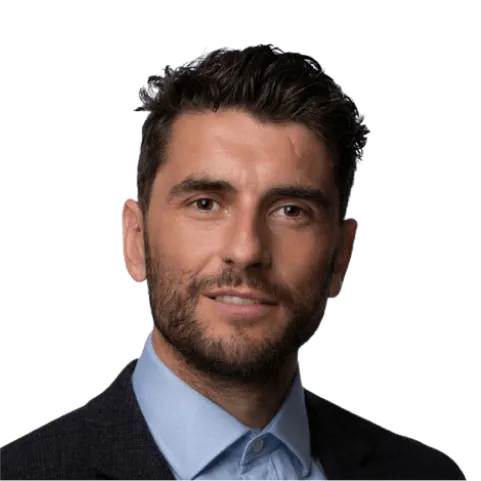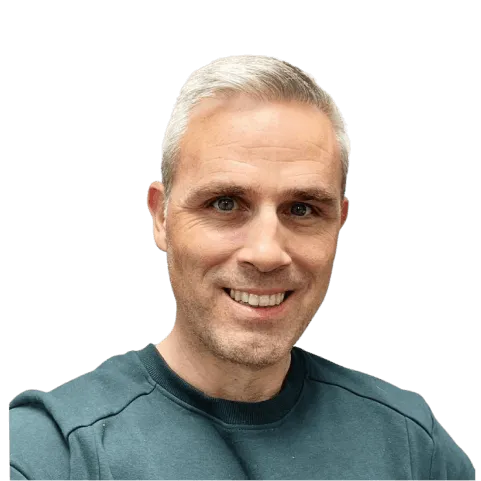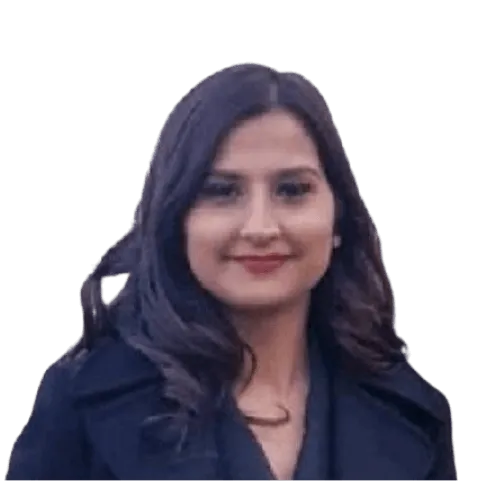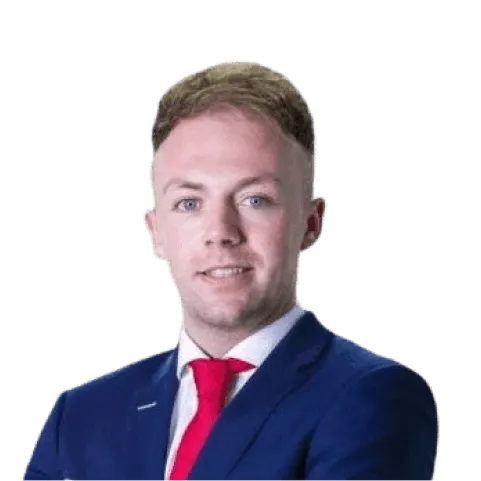


Key Points
Our three big takeaways from Niall's conversation with Karin Volo were
- Think about the questions you ask yourself - Why did this happen to me? vs Why did this happen for me?
- Every event not matter how dire always has the potential to be reframed to try and extract a positive outcome
- Companies are our 300% more likely to be successful with a high trust environment
Let us know what you thought of the episode?
Transcript
Niall O'Carroll
Maybe the obvious place to start is tell me a little bit about the work you do and the wonderful title of Chief Joy Bringer?
Karin Volo
Yeah, as far as I know, I'm the only one on the planet with that title.
I really do, the purpose of my company is to bring joy to the workplace. I run a company called Evoloshen Academy and we work on cultural transformation.
Basically, building trust, that increases productivity and engagement inside of the organization. So culture is really a bit of the foundation of creating a really inspiring and enthusiastic workforce. That's a little bit of the work that we do with Evoloshen. We work with global companies. Now with the whole pandemic, we basically are doing everything online as well. So it's been fun to be able to make a bit of that transition.
Niall O'Carroll
The corporate world can be very jaundiced in some ways. I'm sure you hit roadblocks and challenges? How do you navigate that, or what is it that hooks people into what you're offering?
Karin Volo
Over the years, I have found that when I work with leaders who understand the value and importance of their people and creating a culture where people can thrive, it's quite easy to do this work.
If the leaders do not buy into that, then they're not our ideal clients to work with, because you do have to have the management buy-in for this type of work.
I'm always staying on top of the latest research in terms of what kind of an impact it has on the bottom line. I can really show the impact if you work on engagement strategically or building trust. Ffor example, high trust organizations outperform low trust organizations by 300%. Iit's documented, it's factual. When people start to realize, then things start to happen, for sure.
Niall O'Carroll
My background, prior to my current role has been in the sports world, but I would argue it's exactly the same. It's the same principles of a high performing sports environment. It's where there's high trust. And one thing that I find really interesting, is the idea that relationships between management and staff are so important. If your people feel like you care, if they think you give a shit about them, they're more likely to deliver on the performance expectations. As you talk about a low trust environment a lot of times because people don't believe that management give a stuff. Some organizations will bring you in, but it will be a token gesture to tick a box. How do approach going into an organization where you know when your heart the culture is not quite there?
Karin Volo
That's an excellent question.
I'd like to just comment on your comment about caring because what I'm finding with building trust is that even underneath the layer of trust that you have in an organization, if people don't genuinely care about each other, it's not going to happen, you know, they're coming in, they're doing the work and going home, and they don't really care either.
You really have to have this connection between management and staff. And what I find in most companies is that top management has to be really engaged, excited, they've got the vision, the values, everything there. And then there's a big gap - generally, it's middle management that needs a lot of help.
Our training is basically designed to work on an individual level, as well as a team or organizational level, which means that people go through a personal transformation. A lot of what we teach is based in neuroscience. What I found over the years, is that when people learn the neuroscience stuff behind trust, and what's really going on on a neurochemical basis in your body, human to human transformation starts to happen.
That's where the impact really comes in. Because, as I often say, you can't unlearn what you learn when it comes to neuroscience. And by doing it this way, it makes what's invisible, visible, so that we can actually start to measure it and track it and see what kind of an impact we have, both with relationships, increasing the level of trust and creating these really meaningful conversations inside of an organization.
Niall O'Carroll
It is remarkable. And I love the fact that you go back to science and data to back up the fact that these things matter.
Satya Nadella is the CEO in Microsoft. And when he took over, he insisted on Microsoft implementing a growth mindset philosophy across the whole organization. You hear all the anecdotal evidence of how Microsoft is a much better place to work, because it's become much more about people having committed conversations with each other, and listening and asking questions and learning and being open to the fact that you don't have to know everything.
If you hire somebody with expertise in a certain area, let them do it. You don't have to micromanage - trust them to do their job. That's what you're hired for.
One of the knock-on effects of that was that Microsoft's share price before he took over had been stagnant. In the six years, since he took over, it has gone up massively. There's a clear correlation between a shift in the culture of the organization and financial benefit or a productivity benefit to the organization.
Sometimes middle management, get all the crap. Senior leaders get ideas to introduce these initiatives like yours PepTalk, and it’s dumped on middle management who have had no part in the conversation until going implement it. One of the things I get all the time from middle managers is that they don't have time for this stuff. If you get that kind of an argument, what's your response to that?
Karin Volo
Well, first of all, I mean, if a company invests in the training, then it's up to the individual to show up and partake in that. The people that are really interested take it as a bit of a gift in the sense that they can develop themselves.
Everybody stressed right now, especially middle management, they have a lot on their plate, but what we teach as long as they show up, they will learn some tools that they can experiment with on a day to day basis so it doesn't interrupt their day to day work. It basically gives them more tools to handle whatever situations come up.
It's interesting to see what happens because they start to see results much faster than they weren't expecting just because they tested some of these things.
Niall O'Carroll
With a lot of these tools once are implemented, what you're actually doing is buying yourself time back, because you're not wasting time on a lot of the rubbish that you get caught up in in a day to day.
Karin Volo
Yeah, oftentimes that is the case.
We had one participant from a very large consulting company, who was taking the training at the same time she was doing her annual reviews with her people and because she was able to ask more powerful questions she saved herself so much time, exactly like you're saying. She was getting to the core of whatever she needed to get out of that conversation at that time. And so she wrote and said she was just so much more productive because she was able to get to the root of things much faster.
Niall O'Carroll
What would be an example of a tool or the way you would work with somebody to help them unlock their ability to engage with their work?
Karin Volo
I take the extremes of a low trust versus a high trust.
When you have low trust, what's activating in your brain is generally your back, reptilian brain, your amygdala, you may get the adrenaline running through your body, and it takes 24 hours for that adrenaline to get through your body. You can't actually reach your creativity, your higher levels of thinking, when you're actually acting from your lower brain or your reptilian brain.
When you have high trust, you're actually using a different part of your brain, which is the prefrontal cortex behind your forehead. That's where oxytocin is produced. You get oxytocin, serotonin, all these positive neurochemicals, and it opens up your mind to be able to see things in a much better perspective, you're able to connect to people in a much better, deeper level. You're also able to tap into creative ideas and just things flow. You have better relationships when you can get yourself producing oxytocin on a regular basis.
I'll give you a really good example here, this is one of my favourite examples to share.
We had a partner of a large consulting company take our cultural engagement certification, so she hadn't even taken the deep trust training at that point. But she'd learned enough about what I'm talking about.
She had to go in and mediate a conversation between some indigenous tribes in the local area, and it was very acrimonious. They were not happy with each other. She knew this going in.
As she walked into this huge boardroom there was 12 people on both sides of the table. She could feel the tension in the air, and she just remembered some of this training. She said, ‘okay, we'll go around the table, and we live in such a beautiful town that was down in New Zealand, why don't you just say what do you really love about this town that we live in?’
One by one the answers went around the table. By the time it started coming back towards her, everyone was smiling and laughing. It was like they found a place that they all had a common ground.
She also knew that they were actually activating oxytocin in their body. And so then she started the meeting from there, and it had a completely different outcome. And, you know, it went much smoother than it would have had she not done something like that.
Niall O'Carroll
Isn't that a lovely, lovely message, and it's such a simple philosophy.
We're very much fans of that idea - sitting down with your team, even if it's only once a month, and having a human conversation.
Sometimes people make the mistake of thinking that the conversation has to be really focused on wellbeing in order for it to affect your wellbeing.
Karin Volo
Well, this comes back to caring, connecting human to human shows that you genuinely care.
How are you feeling? How's your family? How are your children doing? And especially now, with everything going on in the world, people need that even more. So I find they need to be able to connect with each other. And to understand that, we're all going through some interesting challenges right now. What can we do to make it better?
Niall O'Carroll
As leaders, it's so important to check out and help our people check out and remind everyone that we focus on what we have control over. From a sporting perspective, we always talk about staying in the moment, staying present. The basic principle of staying present is you don't carry the anxiety of what's gone wrong in the past, you stop worrying about what's going to happen in the future, because that's utterly ridiculous.The only thing you can control is how you're acting in this current moment. And would that be something that would be at the heart of kind of your philosophies when it comes to engagement?
Karin Volo
Yeah, it's definitely a part of what we talk about as well. It's only in this current moment that you can really make a huge impact. I often say for every negative thing that comes in, you've got to counterbalance it with three to five positives because we get so bombarded by negativity. That's something that you have to make as a conscious decision. It's very simple. thing I mean, look, you're in Ireland, I'm in Sweden, we both have sunny days today, oh my, we have something to be grateful for. Simple... it doesn't require a lot of time or effort or energy. It's just it's a mindset shift. It involves a conscious deliberate choice to think and want to want to change your thoughts in that way.
Niall O'Carroll
That's something that you had to consider, a considerable mindset shift, because there were challenges on your mindset in your personal life. And I love the fact that you're laughing now. Because your story is so remarkable.
I'm very conscious of the fact that you don't want to continuously revert back to living in your past. I think for people to understand where you are now, they need to understand what happened to you and how you found this remarkable strength to be to channel your mindset in the way you have. Could you tell us a little bit about the experience you had?
Karin Volo
I really went through a four-year crisis of having to practice what I preach about shifting your mindset, shifting your emotions, and all of that.
The very condensed version of a very long and complicated story was that years ago, my first husband was a professional con man, and very abusive, and I divorced him. I moved to Sweden and found out that everything he told me was lies.
I rebuilt my life here in Sweden, and then basically, I think, was like six years later, I was working with my business ready to expand it, I had a business mentor in the US. I went on a trip there; I am half American, half Swedish, we didn't clarify that.
Anyway, so I had this fantastic week in the US, everything was falling into place. And right, as I was getting ready to board the plane to come back home to continue with my business, I actually got arrested, and I got taken into custody.
My first husband had used my name on his fraudulent business activities. I got taken into high-security jail, where I sat for 1352 days, which is just short of four years.
It was a nightmare. My daughter's at that time were six and eight. I missed out on that time with them. It was really a day to day battle for me to try and stay in a positive frame of mind during those four years. I was reading everything I could get my hands on, practising all the exercises I could think of and really just focusing on the choice between the fear of the worst that could happen or the love of my family.
Anytime those fearful emotions, anger, frustration, depression, sadness, all of those took over me, I would just switch over and I play this movie of my charges are dropped, I'm released, I get to go home, I get to return my family and be a mom.
In the end, that's exactly what ended up happening. It was a really long and difficult time in my life. But I learned so much. I knew when I came home that I was not supposed to be doing what I was doing with my previous business. I was supposed to teach people what I'd learned. And I didn't know how that was going to happen. And so another two years passed, but basically ended up writing a book called Engage.
That book was the entry into the corporate world to bring what I had practised as on a personal level with myself and my family that I knew for a fact worked because I was doing it. For example, gratitude, that this stuff actually works. Then we found a lot of research behind it that actually backed it up. That became basically the book Engage. And then that took me on the path to start the work that I do now, which is with Evoloshen Academy and transforming company cultures and transforming people's lives.
Niall O'Carroll
I think what's important for people to understand is, you weren't in a prison cell. You didn't have a court hearing. You didn't have a trial, there wasn't a conviction. This was all pending you being extradited to Mexico and there were all legal loopholes around whether you were eligible are going to be extradited or not.
For any normal human being bitterness, anger, depression, upset, not being able to see your children, all of these things have to have a massive impact on your mindset.
What was it about that experience, that on release, you were able to channel yourself into writing?
Karin Volo
First of all, I did a lot of this what I call inner work. Forgiveness was one of the key component for me to be able toto come out as a better person.
The mental training of playing this movie, in my mind of visualizing myself coming out and being with my kids, I wanted to immerse myself in a lot of positive things, things that inspired me, and where I could inspire others, and just as much positive environment intake as possible.
The first year after, I couldn't even talk about my story without crying. I mean, I was in deep therapy, and really working through it, and trying to find my way back in some way. It was a long process.
They told me when I started the therapy, that whatever length of your crisis was, it's going to take that long for you to heal. And I was like, no freakin way is this gonna take me four years to heal from this, there is no way I've got too much in me, I want to do so much now because I was so held back.
But in the end, for the entire family, it did take that and a little bit longer in terms of really healing and coming back to kind of our normal selves.
I think there's with any crisis, you do need to respect the healing process. As human beings, we have to process those emotions. And if we don't process it, it gets stuck in our bodies somewhere. And that can lead to disease, or it could lead to, you know, all sorts of problems.
And it can lead to those things coming back into your life. Because I believe, whatever challenge we go through, there's always a lesson there. And if you don't learn the lesson, it's gonna come back.I've just I've noticed patterns in my own life.
Niall O'Carroll
Not to belittle what you're experienced, but it's the thing that I would work on with athletes all the time was that idea about learning from your mistakes, that it's your mistakes that make you better at what you do.
So many people are hamstrung by things that have happened to them in the past. One thing I love about talking to you, is that there is no sense of bitterness, but you have every right to be.
When you talk about forgiveness, and you talk about gratitude, and you talk about culture, and basically you've devoted your life and your business since then, to improving the culture and the lives and the communication of people. How much of that has contributed to your healing?
Karin Volo
A lot.
When my book Engaged came out, I spent about a year speaking and l often had people coming up to me and saying it just touches their heart. And then they open up and they share with me what they are going through.
One of the things that I found is that when people hear my story, they can use it as a reflection point, like, ‘Oh, well, I thought my life was bad, but it's not that bad’.
So it automatically puts them in a state of gratitude and appreciation for where they are, regardless of the situation. That is a healing process for me because it makes me feel like those four years did not go to waste. I can use it as catalysts to inspire people to make them realize that, wow, I can get through this too.
When you go through trauma, it sits in your cells. And if you don't process it, you will have some sort of emotional reaction. But if you process it, it becomes a story. It's a part of the tapestry of your life. If you process it enough, it doesn't have that visceral feeling anymore. Y
I do share my story quite a bit, because I use it to one explain why I do what I do, but to inspire people to make them realize like, ‘Oh, the lockdown situation we're going through right now in so many countries’.
I had so many friends come to me back in March of 2020, basically sayingI have so much experience with lockdown, can't I tell people what you did to survive.
I have put outsome classes on resiliency and things like that, and just teach people what I was using during that time. And it helps so much. just finished a training with a whole company, all the employees taking it, and the module that the session that they liked the most was the resiliency and care.
Niall O'Carroll
Resilience has become very popular at the moment, there's a logical reason for it.
In Ireland, we introduced a wellness program in the schools for kids. I sometimes feel it's not necessarily the right message to tell kids that it's it's okay to be depressed because it's absolutely fundamentally not okay to be depressed. It sucks.
I'm not saying that there's anything wrong being depressed. And absolutely, you need to talk about things when you're having a tough time. In my view, what we should be teaching them is that life is tough. And these horrible things happen. But there are things you can do to navigate. Instead of telling them that it's okay to be depressed, we should be telling them stories like yours, and saying, you can go through the most horrible things in your life. But human beings are remarkably resilient.
I go back to the Epictetus quote that I come up with all the time, that is not the event, but your opinion of it, which causes suffering.
That's a very flippant and easy thing for me to say, when I wasn't in a jail cell for four years.
We all have the capacity to deal with things that we don't necessarily think we can.
What you came through, and you've channeled it in a way that you've actually helped your healing by helping other people, which I think is a really wonderful and remarkable thing to do.
From your own personal experience, what is it that you think is the key to resilience?
Karin Volo
Wow, that's a really good question.
I think part of it is exactly what you stated with that quote, which is that you have to reframe what's happening in your life.
For example, one of the things that I often say is the quality of your life is dependent on the quality of the questions you ask. When I went into this whole ordeal, and it started, I was really down and I was asking myself questions, like ‘how could this happen to me?’ and ‘why was I so stupid to fall in love with this man?’ - all these disempowering victim mentality questions
Over the months and years, as I was reading different books, I found that if I changed the question instead of ‘why is this happening to me?’ to ‘why is this happening for me?’ - I would get different answers. I would actually feel better.
My questions switch to ‘what's the lesson here? How can I help others? Who am I meant to help or support today?’
Part of it was surrendering, like, Okay, I'm here today, I can't change anything about it, what can I do to make the day better today. Things like that, that made me realize, wow, I have so much power inside of me, that I can change the way I feel just by changing my thoughts or my emotions and changing the words that I'm using.
I think is a real key in terms of resilience is the quality of the questions you ask change the quality of your life.
Second one, I would say we come back again to gratitude was one of the most powerful things that I did every night before I went to bed. I still do to this day, what are the three to five things I'm grateful for.
When I wake up in the morning, I hit the snooze button one time, so that I can go through my gratitude and set the tone for the day. I know that by doing that, and it's a habit now, it puts me in a more positive frame of mind.
When you start the day in a positive frame of mind, guess what, if something happens, it's not gonna affect you as much as if you work on the wrong side of the bed, so to speak.
Niall O'Carroll
There have to be times when you have a day where it eats back into you a little bit, or there's a little bit of negativity, or there's a memory of an event while you were locked up. How do you stop that from taking over?
Karin Volo
First of all, active visualization was something I used every single day. I completely believe in it. The power that we have with our minds is pretty phenomenal when you learn how to work with it, and how to kind of challenge so that you focus that energy.
I can't remember what story this was exactly. But basically, there was a gift for humankind that the great maker was going to hide it somewhere.
The crow said, ‘hide it in the clouds’.
No, no, they'll find it there.
The mole said, ‘we'll hide it down in the ground’
No, no, they'll find it there.
And the fish said, ‘hide it in the water’.
No, no, they'll find it there.
And then finally, someone said ‘No, hide it inside of them. That'll be the last place they look for it’.
Right? And it's true.
We have this innate power within us that people just maybe aren't aware of.
For me handling any difficult situation, I've practised this stuff on a daily basis for so long, it's like muscles. Any negative thing that happens to me, I'm able to turn it around really quick. That's because I'm, I've practised and I have so many tools to handle it.
That's not to say that I don't get sad. Of course, I do.
We're human beings and we all have emotions.
One of the tools I developed partially while I was in the jail experience was what I call geometer, which people can get at my personal website.
It's basically a list of our emotions - we have positive emotions and we have negative emotions, and we spiral up and down these emotions. That's our human experience.
So do I get mad? Occasionally? Yeah. Do I stay mad long? No, it's not gonna serve me, why should I stay mad long.
It's having that emotional awareness of yourself. When you have tools, you just pull them out when you need them, and they work, then you move on.
I think that's really part of the powerful work that we do with Evoloshen.
It empowers each individual, and then it's up to them to have that emotional awareness and to start to use these tools. And when you use the tools over and over again, it becomes a habit and then you become a better person, because you're able to handle situations better and have better conversations and manage stress in a much better way.
So yeah, there's just there's a whole lot behind it. And I'm kind of a geek when it comes to this. I love discovering like scientific stuff that backs up what I know because then I can get it through to people. I know from a personal experience, it works. But then hey, here's the neuroscience or the psychological report, you know,
Niall O'Carroll
That's absolutely brilliant. Thank you so much.
Karin Volo
I'm glad we got this done. Yeah. Thank you.
Latest Episodes


See PepTalk in action











